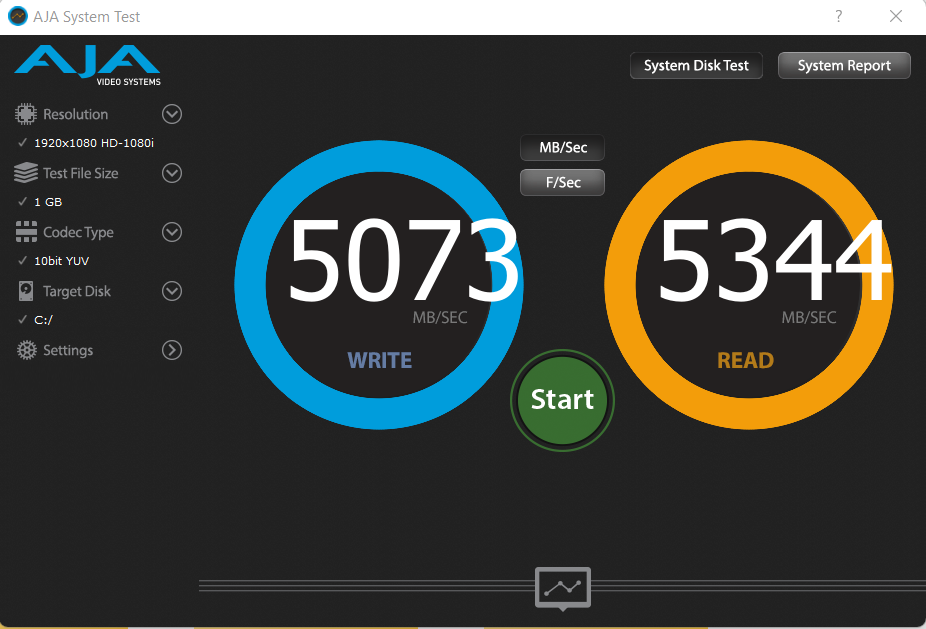AJA VIDEO SYSTEM DISK TEST
The AJA Video Systems Disk Test is relatively new to our testing and tests the transfer speed of video files with different resolutions and Codec.
TxBench is one of our newly discovered benchmarks that we works much the same as Crystal Diskmark, but with several other features. Advanced load benchmarking can be configured, as well as full drive information and data erasing via secure erase, enhanced secure erase, TRIM and overwriting. Simply click on the title for a free copy.
PASSMARK PERFORMANCE TEST
Passmark Performance Test is perhaps one of the PC worlds leading benchmarks, not only testing such things as CPU, memory, graphics and storage, but also providing a comparison to millions of systems and their hardware worldwide.
We wouldn’t expect to have high numbers or placement with a stock laptop system but we simply had to include this to show the storage result. The Phison E18 is rated as being in the top 99% percentile of all SSDs tested. That is some accomplishment!
The SSD Review uses PCMark 8’s Storage test suite to create testing scenarios that might be used in the typical user experience. With 10 traces recorded from Adobe Creative Suite, Microsoft Office and a selection of popular games, it covers some of the most popular light to heavy workloads. Unlike synthetic storage tests, the PCMark 8 Storage benchmark highlights real-world performance differences between storage devices. After an initial break-in cycle and three rounds of the testing, we are given a file score and bandwidth amount. The higher the score/bandwidth, the better the drive performs.
As a bit of a comparison, the Samsung 980 Pro scored 5081 with a storage bandwidth of 670MB/s while tested in our main system. This result is very impressive for a laptop Gen 4 SSD result. Lets take a quick look at the PCMark 8 Mainstream Gaming Result:
PCMARK 10 FULL SYSTEM STORAGE BENCHMARK
PCMark 10 Storage Benchmarks produce an overall score as a measure of drive performance. Comparing devices is as simple as comparing scores. The tests also measure and report the bandwidth and average access time performance for the drive. Each test uses traces recorded while performing real-world tasks such as booting Windows 10, starting applications such as Adobe Photoshop and Illustrator, working with applications such as Microsoft Excel and PowerPoint, and copying several large files and many small files.
By looking at the comparison chart below, we see that the Dell Inspiron with the Phison E18 sample SSD ranked fourth and better than both the Mushkin and Team Group Gen 4 SSDs. This is particularly impressive, especially when comparing to the Gen 4 Mushkin Gamma as its performance was that of 7GB/s as well, with both the Mushkin and Team Group SSDs having been tested in our desktop PC Test Bench…not the laptop.
Just to add to things a bit, we tested the Dell Inspiron with Phison E18 sample SSD with the PCMark 10 Main Office Test Suite as well as Modern Office Battery Life.
REAL WORLD FILE TRANSFER COMPARISON
We have put the Phison E18 B47R Fortis 2TB Evaluation SSD beside a few other Gen4 SSDs to see how this compares to the norm, remembering of course that this SSD is tested in the Dell Inspiron which contains a lower powered mobile Intel CPU that may effect the overall result.
The most obvious pint to note from this test is the fact that moving small OS data takes much longer in the dell Inspiron than it does in our desktop Test Bench. Having said that, we were still very impressed with the speed of moving media such as video, photos and music.
 The SSD Review The Worlds Dedicated SSD Education and Review Resource |
The SSD Review The Worlds Dedicated SSD Education and Review Resource | 

